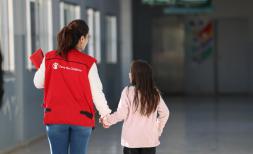Ukraine: "There is no school - what are we graduating from?" School leavers abstain from graduation festivities after turbulent final year
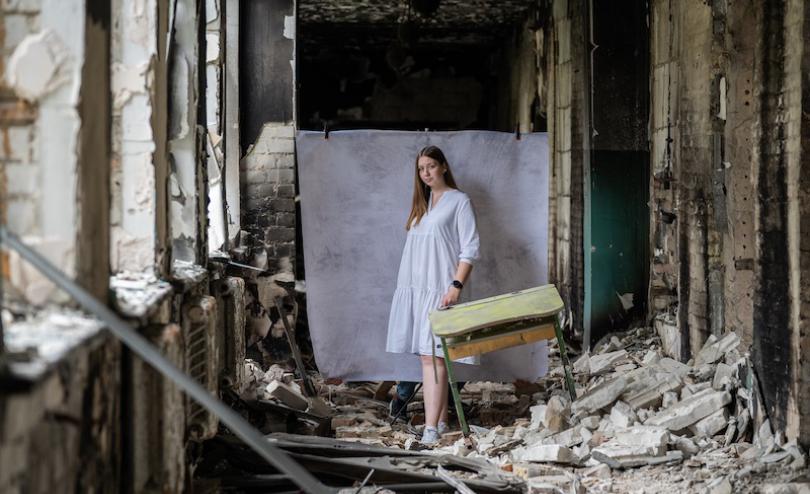
KYIV, 17 July 2023 – After completing 11 years at a secondary school near Kyiv, one cohort of Ukrainian school leavers opted to abstain from graduation festivities this year with their final studies wrecked by about 17 months of war.
Save the Children photographed and interviewed graduates from a destroyed school near Kyiv in June, creating a virtual yearbook featuring their hopes and aspirations. The exact location and name of the school is not being disclosed for the protection or for the safety of the children involved.
Since war escalated in February 2022, over 3,300 academic institutions have been damaged or destroyed in Ukraine. While many students we spoke to didn't feel like celebrating graduation in a school damaged by fighting, most remained optimistic for the year ahead and for their future studies and careers.
In March 2022, tanks, armoured vehicles, and armed men entered a village to the north-east of Kyiv.
"Residents were terrified. Loud noises and gunshots were heard all around, they were even firing at some of the people who were trying to escape," said Lyudmila, the local headteacher.
Before full-scale war, Lyudmila's school was a newly renovated building hosting 400 students where every teacher had a laptop, and every classroom was equipped with the latest educational equipment.
Now, all that is left are ashes, debris, and the carcass of a school bus that used to pick up children from a nearby village. The occupying forces reportedly set the school ablaze as they fled from the area.
Without a school, and as hostilities forced families to scatter to different towns and even abroad, students had no choice but to finish the academic year online. When classes resumed in September at a neighbouring institution, even though fighting in their area had ceased, many pupils were afraid to return.
"When we offered to resume face-to-face learning for the first time, many parents did not want to let their children go to school. They were afraid - especially those from the neighbouring village, who experienced persistent air raids. As soon as the air raid started, the parents drove to pick up their children from school," Lyudmila said.
Aware of these fears, Save the Children converted a local government building into a Digital Learning Center (DLC), a safe space where elementary school children can gather for classes and access psychosocial support from trained staff.
Senior students still travel to the neighbouring village for classes, but they miss their old school, of which they have many fond memories.
"In our school, we always had exhibitions and photo days. Each class used to prepare a photo wall and then we would decide who was the best. They were decorated with balloons and colourful stripes. Before holidays, everyone was doing makeshift decorations during lessons," said Kateryna*, 16, a 2023 graduate.
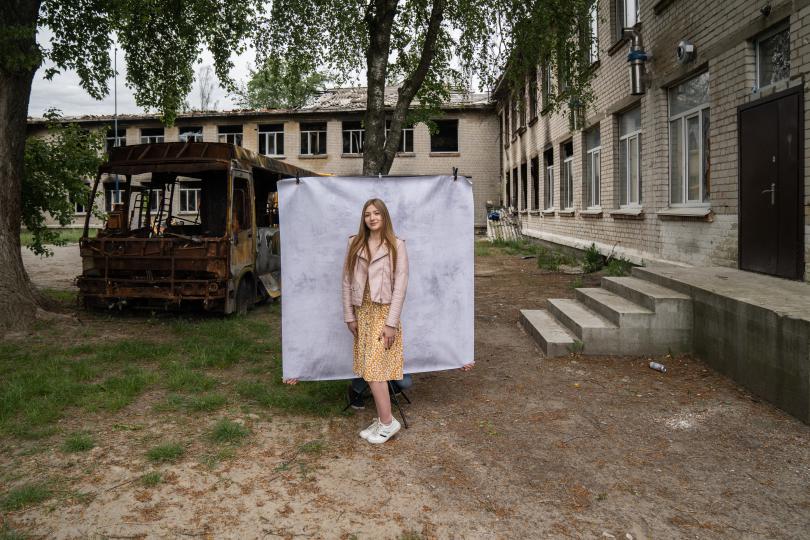
A few years before the war escalated, the school marked its 50th anniversary. To celebrate, children made a picture collage of each year's graduate class. But now Oleksandra*, their form tutor, said there was no appetite to celebrate – especially as their old school lies beneath rubble.
"The children did not want the graduation festivities. We persuaded them to at least have the ceremony. They don't feel like celebrating at all, they say, "So what? Anyway, there is no school - what are we graduating from? You won't walk through the corridors or sit in your class."
"The children have matured a lot, and their values have changed. They are now treating the future more seriously - what to do next, how to study."
Despite the turbulent times these children have experienced since full-scale war erupted in February 2022, many remain optimistic.
Nadiya*, 16, a future cybersecurity specialist
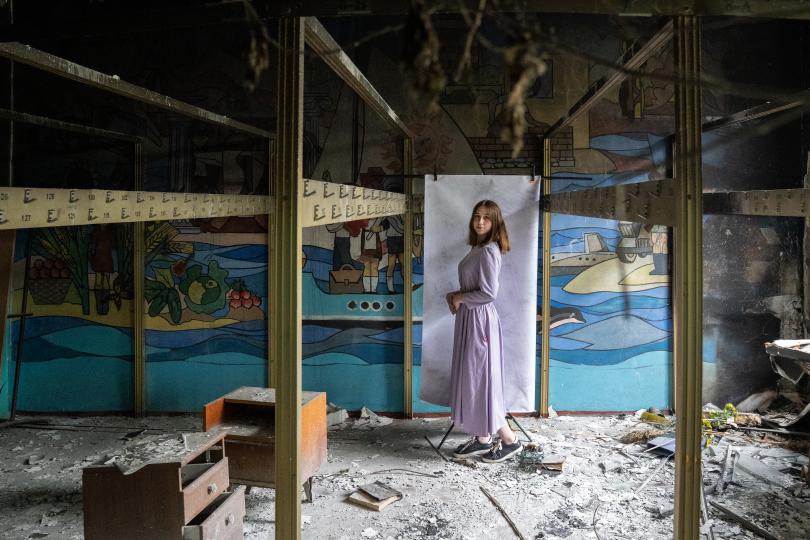
Nadiya*, 16, dreams of becoming a cybersecurity specialist. Last spring, fighting trapped her mother in a nearby settlement where she worked. Nadiya had to look after her younger brother, sister, and cousin for two weeks.
"The children were very nervous at first, shaking. They didn't even want to eat, but I made them. Once, when it was quiet in the afternoon, and there was no noise, the children decided everything was over and started screaming and fighting.
"I opened the door, stood outside for a few minutes, calmed down, then returned and told them: "They are shooting from machine guns over there; sit quietly." And probably for an hour after that, they sat quietly," Nadiya said as she calmly told the story.
Olena*, 17, future journalist
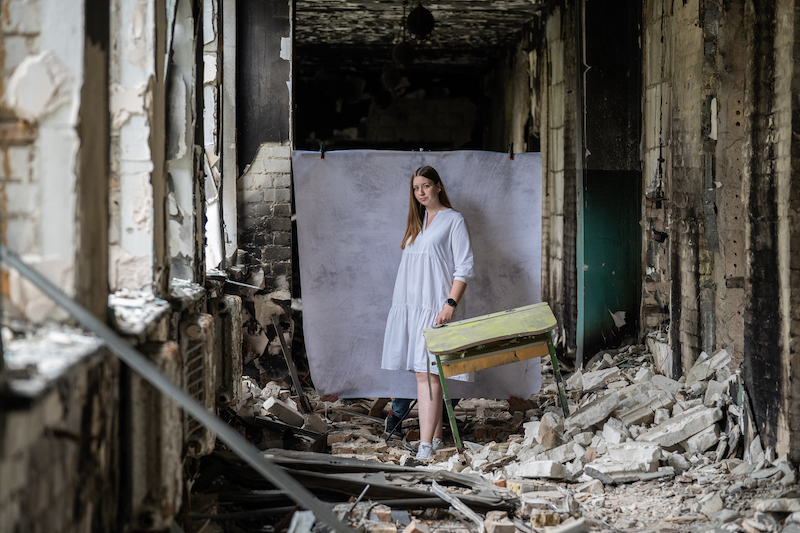
Hostilities forced Olena*, 17, and her family to flee from their home. Although they have now returned, the war has led her, and many of her classmates, to consider professions that will benefit their communities and beyond.
"I will become a journalist because I want to learn more, to expand my worldview. I want to reveal the truth.
"Since the beginning of the full-scale war, I have lost six months of my life. I didn't live at home for six months – but I longed to return. And the more we live under martial law, the more I want to bring everything to light, to find out where the truth and justice are," said Olena, who finished school with honours for extraordinary learning achievements.
Borys*, 17, future IT developer
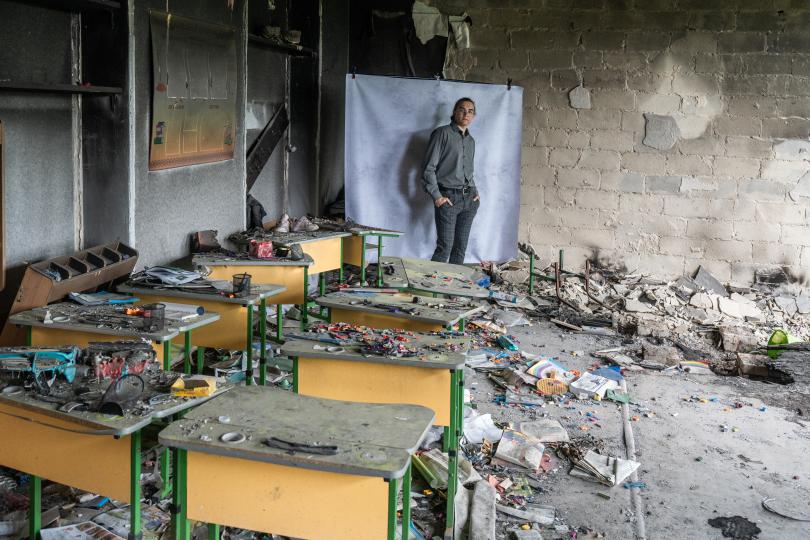
Borys*, 17, who wants to become an IT developer, said:
"I began to live one day at a time because I didn't understand what could happen tomorrow and the day after tomorrow. That's why I have fun, try to be somehow interested in everything simultaneously, and I also want to go for a walk with friends, enjoy the moment.
"I would love to develop websites in the future, to be a front-end developer. I tried learning programming, and was good at it, I liked it.
"My biggest wish is to start a couple of enterprises – an internet-café and a gym. I have dreamt of owning a cafe with live jazz music since I was a child. But for now, I just want to enter university.
"I would like the world to pay more attention to those living in combat areas. I want the world to unify and help those who are the most vulnerable. Without friendship, I think, and without help it will be very difficult to survive."
Government plans are underway to renovate the children's school.
Although Kateryna, Olena and Borys won't be able to graduate from the place where they shared desks for 11 years, for other local children the prospect of returning to the village school is on the horizon.
---
Save the Children has been working in Ukraine since 2014. Since war escalated on 24 February 2022, we have reached nearly 500,000 children.
Save the Children works closely with 26 partners in Ukraine to provide life-saving assistance such as food and water, cash transfers, and safe spaces, to make sure children and families impacted by this crisis have the support they need.
* indicates when a name has been changed
For further enquiries please contact:
· Nina Teggarty, Media Manager, Save the Children nina.teggaryt@savethechildren.org
· Vsevolod Prokofiev, Media Manager, Save the Children Ukraine Vsevolod.Prokofiev@savethechildren.org
